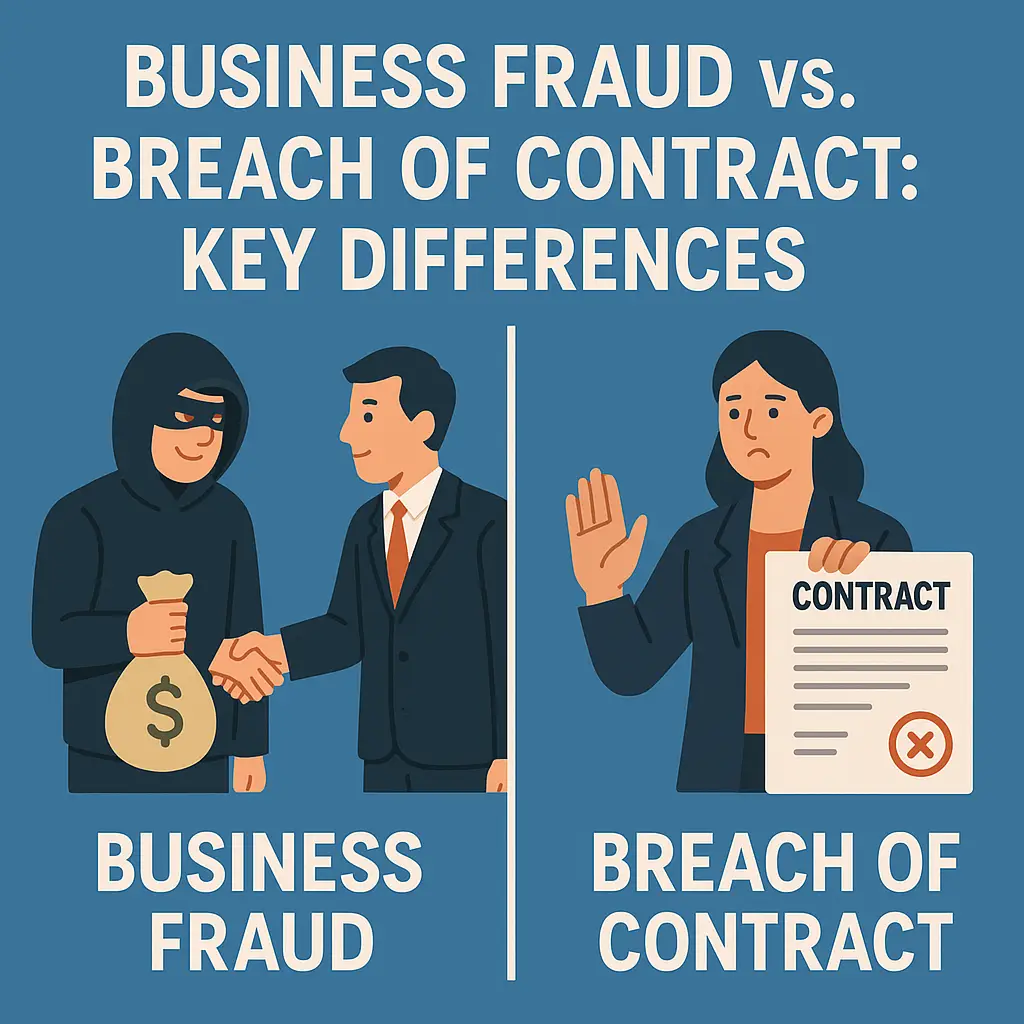Not every broken promise is fraud — and not every breach of contract is just a business mistake. In Florida, the line between a breach of contract and business fraud can determine whether you can recover punitive damages, rescind a deal, or hold someone personally liable.
If your company has been misled, shortchanged, or outright lied to, it’s important to understand the legal difference between breach of contract and fraud — and how each one affects your rights.
🤝 What Is a Breach of Contract?
A breach of contract occurs when one party fails to perform their obligations under a valid agreement — without a legal excuse.
Examples:
- A vendor fails to deliver materials on time
- A customer refuses to pay for services rendered
- A partner breaks the terms of a non-compete
- A party cancels a deal early without justification
Legal Remedies:
- Compensatory damages (e.g., cost to replace performance, lost revenue)
- Sometimes attorneys’ fees (if your contract allows)
- Specific performance in rare cases (e.g., real estate)
🔍 Important: Breach of contract does not require intent to deceive — it’s about nonperformance, not dishonesty.
💼 What Is Business Fraud?
Fraud is a deliberate deception designed to mislead or manipulate another party into acting — usually to the fraudster’s benefit.
In business litigation, fraud can arise:
- During contract negotiations (fraudulent inducement)
- Within the performance of a contract (fraud in the execution)
- As a stand-alone tort, separate from any contract
Common Types of Business Fraud:
- False promises made to secure a deal
- Misrepresenting financials or business conditions
- Concealing important facts the other party relied on
- Knowingly invoicing for services not performed
⚖️ Key Legal Differences in Florida
| Feature | Breach of Contract | Fraud (Business Tort) |
|---|---|---|
| Intent required | No — can be accidental or negligent | Yes — must involve intentional deception |
| Based on contract? | Yes — must be a valid, enforceable contract | Not necessarily — can occur without a contract |
| Damages | Economic damages (direct, consequential) | Economic + punitive damages (sometimes) |
| Rescission possible? | Rare | Yes — courts may cancel fraudulent deals |
| Personal liability? | Usually limited to the business | Yes — individual actors may be liable |
| Attorney’s fees recoverable? | Only if the contract allows it | Not typically, unless allowed by statute |
⚠️ Fraud claims are more complex — but they also carry more legal leverage if you can prove them.
🚫 When Is a Breach Not Just a Breach?
A broken contract becomes potential fraud when:
- The person never intended to follow through
- They lied about something material to the deal
- They used false documents or statements to induce the contract
- They concealed important risks or defects that weren’t discoverable
✅ Example: A supplier signs a contract but already knows they can’t deliver — and fails to disclose it. That’s more than just a breach — it may be fraud.
🧾 Why This Distinction Matters in Litigation
Fraud Claims Open the Door To:
- Punitive damages (designed to punish the wrongdoer)
- Rescinding the contract instead of just enforcing it
- Piercing the corporate veil and holding owners personally liable
- Tolling the statute of limitations (more time to file your claim)
Fraud also gives you greater negotiation leverage — and can dramatically shift the tone of a case.
⚠️ Proving Fraud Is Harder — and Riskier
To win a fraud claim, you must prove:
- A false statement or omission of material fact
- The speaker knew it was false
- You relied on it
- You suffered damages as a result
You’ll need evidence of intent, not just poor performance. Vague claims like “they lied to us” won’t cut it — you must show who said what, when, and how it affected your decision.
🚫 Courts don’t want fraud claims used as a “bad faith” weapon in every contract case — they will dismiss weak fraud allegations quickly.
When to Plead Both
In many Florida business lawsuits, you may allege:
- Breach of contract (to enforce the deal and recover damages)
- Fraud (if you believe there was deception involved)
Courts may let both claims proceed — but they’ll require you to clearly separate the facts supporting each. Don’t assume that bad conduct = fraud. It has to be intentional deception, not just failure to deliver.
How Douglas Firm Helps
At Douglas Firm, we help Florida business owners:
- Determine whether fraud, breach, or both claims apply
- Gather the right evidence for court or settlement
- File lawsuits against vendors, clients, partners, or former employees
- Defend your business against unfounded fraud allegations
Whether you’re seeking damages or trying to exit a bad deal, we help you pursue the right strategy — without overreaching.
Contact Douglas Firm Today
If you believe your business has been deceived — or you’re facing a legal dispute involving fraud or breach — we’ll help you understand the differences and assert your rights effectively.
📞 954.474.4420
📧 andrew@douglasfirm.com
🌐 www.douglasfirm.com
RELATED ARTICLES
